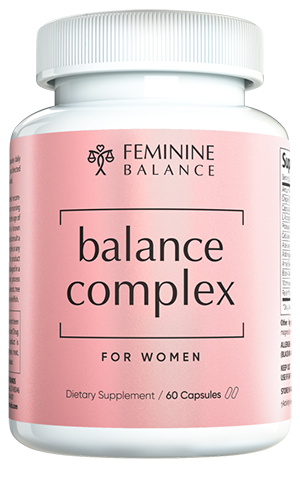On this page
On the go and don't want to read? Listen to this article's podcast episode here:
Understanding Hypoactive Sexual Desire Disorder (HSDD) and Its Impact on Vaginal Health
Sexual desire is a complex interplay of physical, emotional, and psychological factors. For many women, libido can ebb and flow due to stress, hormonal changes, life transitions, and health conditions. However, when low sexual desire persists, causing distress or relational difficulties, it may be classified as Hypoactive Sexual Desire Disorder (HSDD).
HSDD is characterized by a lack of sexual interest or desire for sexual activity. While the condition itself is multifaceted, one often-overlooked aspect is the role that vaginal health plays. A healthy vaginal environment supports comfort, confidence, and overall sexual well-being. In contrast, issues like chronic infections, dryness, or inflammation can intensify sexual discomfort, lowering libido further and making intimacy less appealing.
Understanding how vaginal health affects sexual desire—and how conditions like HSDD may be linked to underlying imbalances—is crucial for women seeking to regain intimacy and pleasure. By focusing on nurturing vaginal well-being, addressing inflammation, preventing infections, and restoring microbial balance, women can create a supportive environment for renewed sexual desire. While there is no one-size-fits-all solution to HSDD, holistic care that includes targeted probiotics, nutrition, and lifestyle changes can pave the way for improved comfort, self-confidence, and sexual vitality.

What Is Hypoactive Sexual Desire Disorder (HSDD)?
HSDD is defined as a persistent or recurrent absence of sexual thoughts, fantasies, or desire for sexual activity that causes personal distress or difficulty in relationships. Factors contributing to HSDD include:
- Hormonal Fluctuations: Changes in estrogen, testosterone, and other hormones—common during menopause, postpartum, or with certain health conditions—can influence libido.
- Psychological Stressors: Emotional issues such as anxiety, depression, or unresolved relationship conflicts can reduce sexual interest.
- Medications and Medical Conditions: Some medications (e.g., antidepressants) or conditions (e.g., diabetes, thyroid disorders) may lower sexual desire.
- Physical Discomfort or Pain: Chronic pain, vaginal dryness, or recurrent infections can make sexual activity uncomfortable, diminishing desire over time.
While traditional approaches to HSDD might focus on hormones or psychological aspects, considering vaginal health offers another avenue of support. Creating an environment free from discomfort, infection, or inflammation can improve one’s relationship with intimacy.

The Link Between HSDD and Vaginal Health
Healthy sexual desire involves positive reinforcement from pleasurable experiences, comfort, and confidence. When vaginal health is compromised, sexual activity may become painful, irritating, or fraught with the anxiety of recurrent infections. Over time, these negative experiences can lead to a conscious or unconscious avoidance of intimacy, reinforcing HSDD.
Key ways vaginal health affects libido:
Vaginal Dryness and Discomfort:
Low estrogen levels, certain medications, or stress can reduce lubrication. Discomfort, itching, or painful intercourse (dyspareunia) reduces the incentive for sexual activity. If every intimate encounter leads to soreness or irritation, sexual desire naturally declines.
Chronic Infections and Inflammation:
Frequent bacterial vaginosis (BV), yeast infections, or urinary tract infections (UTIs) cause frustration, pain, and uncertainty. This cycle of infections can lessen confidence in one’s body, increase stress, and ultimately diminish sexual appetite.
Hormonal Imbalances and Microbiome Disruptions:
The vagina is home to a delicate microbiome. Dominated by Lactobacillus bacteria, this ecosystem keeps pH levels acidic, deterring harmful pathogens. Hormonal changes and stress can shift this balance, leading to imbalances that manifest as dryness, odor, or unusual discharge. These issues can make a woman feel self-conscious, thereby dampening desire and sexual spontaneity.
Emotional Well-Being and Confidence:
Sexual desire is not purely physical; emotional well-being and body confidence matter greatly. Feeling uncomfortable “down there” can create anxiety about intimacy, reinforcing avoidance behaviors central to HSDD.
Strategies for Improving Vaginal Health and Supporting Sexual Desire
Addressing HSDD often requires a holistic approach. While therapy, communication with a partner, or hormone treatments may help, optimizing vaginal health is a tangible and empowering step women can take on their own.
1. Nutrition and Lifestyle
- Balanced Diet: Foods rich in antioxidants, essential fatty acids, and phytoestrogens (e.g., soy, flaxseed) can support hormonal balance and mucosal health. Adequate hydration also ensures tissue elasticity and comfort.
- Regular Exercise: Moderate activity improves circulation, including blood flow to the pelvic area. Enhanced blood flow may support natural lubrication and tissue health.
- Stress Management: Chronic stress can weaken the immune system, disrupt hormones, and affect libido. Incorporating relaxation techniques like yoga, meditation, or massage can reduce stress, indirectly benefiting vaginal and sexual health.
2. Proper Hygiene and Gentle Products
- Gentle Cleansing: Use fragrance-free, mild cleansers. Avoid douching or harsh soaps that strip away natural oils and disrupt microbial balance.
- Breathable Fabrics: Opt for cotton underwear and avoid tight-fitting clothing that traps moisture, promoting bacterial or fungal overgrowth.
3. Prompt Management of Infections
- Early Detection and Treatment: If experiencing unusual discharge, odor, or irritation, seek medical advice promptly. Swift treatment prevents chronic inflammation and reduces recurrent infections that discourage intimacy.
- Strengthening Immunity: Good general health aids the immune system in controlling infections before they become chronic issues.
4. Hormone Considerations
Discussing Hormone Therapy:
For some women, low estrogen is a driving factor in dryness and low libido. Under medical guidance, localized estrogen creams or hormone replacement therapy (HRT) may help restore moisture and comfort.
Natural Lubricants and Moisturizers:
Applying water-based lubricants or vaginal moisturizers can alleviate dryness, improving comfort during intimacy and building positive sexual experiences that enhance desire.
5. Incorporating a Targeted Vaginal Probiotic
- Restoring Microbial Balance: A high-quality vaginal probiotic can help replenish beneficial Lactobacillus species, maintain acidic pH levels, and deter harmful microbes.
- Reducing Inflammation and Irritation: Probiotics support tissue health and immune function, potentially reducing dryness and discomfort over time.
- Enhancing Confidence: Knowing you are proactively addressing the root causes of discomfort can improve self-image, lower anxiety about infections, and gradually rebuild sexual desire.
Introducing Balance Complex: A Vaginal Probiotic for Overall Wellness
While the focus remains on understanding HSDD and the importance of vaginal health, it’s worth mentioning a tool to support these efforts. Balance Complex is a scientifically formulated vaginal probiotic designed to restore microbial balance, curb inflammation, and support immune defenses—factors all crucial in addressing the downstream effects of estrogen deficiencies and chronic discomfort that feed into low sexual desire.

Balance Complex
See Verified Users Reviews Below
Here's what our customers says About Our Product:
Key Ingredients in Balance Complex and Their Benefits
- Vaginal Probiotic Blend (100 Billion CFU/g):
- Lactobacillus acidophilus: Maintains acidic pH, deterring harmful bacteria and fungi.
- Lactobacillus rhamnosus: Bolsters immune responses, helping clear infections and inflammation.
- Lactobacillus reuteri: Supports tissue healing, stabilizing the vaginal ecosystem and reducing irritation.
- Lactobacillus plantarum: Offers antioxidant properties, aiding in tissue resilience.
- Bacillus coagulans: Contributes to long-term balance, ensuring a stable, healthy environment.
- Cranberry and D-Mannose Blend (300 mg):
- Prevents harmful bacteria from adhering to vaginal and urinary tract walls, reducing the risk of UTIs and subsequent inflammation.
- Oregano Leaf Extract (250 mg):
- Provides natural antimicrobial benefits, targeting pathogens without upsetting beneficial microbes.
- Caprylic Acid (400 mg):
- Addresses yeast overgrowth, preventing chronic fungal infections that contribute to discomfort and reduced libido.
- Protease (50 mg) and Cellulase (32 mg):
- Break down bacterial biofilms, enhancing probiotic effectiveness and ensuring beneficial bacteria can thrive.
- Aloe Vera Leaf (50 mg):
- Soothes inflamed tissues, reduces irritation, and improves comfort—essential for women struggling with dryness and pain.
- Arabinogalactan (50 mg):
- Boosts immune response, aiding the body’s natural defenses against infections and inflammation.
- Anise Seed (50 mg):
- Offers antimicrobial and anti-inflammatory properties, further supporting vaginal comfort.
- Black Walnut Hulls (50 mg):
- Acts as a natural antifungal and antibacterial agent, maintaining microbial harmony in the vagina.
- Wormwood (50 mg):
- Supports immune resilience and a balanced vaginal flora, essential for preventing recurrent infections and inflammation.
- Reishi Mushroom (25 mg):
- Reduces chronic inflammation, bolsters the immune system, and supports tissue healing—factors that help restore comfort and potentially improve sexual desire over time.
How Balance Complex Supports Women Facing HSDD
- Restoring Microbial Balance: By replenishing beneficial bacteria, Balance Complex helps maintain an acidic pH and deter opportunistic pathogens. A healthier environment reduces persistent irritation that can dampen sexual interest.
- Reducing Inflammation and Irritation: Anti-inflammatory ingredients calm irritated tissues, alleviating dryness and discomfort. When sexual activity no longer feels painful or fraught with worry about infections, the door to desire opens a bit wider.
- Preventing Recurrent Infections: A stable, balanced microbiome means fewer bouts of BV, yeast infections, or UTIs. Freed from these disruptions, women can approach intimacy without the fear and stress caused by ongoing health issues.
- Supporting Immune Function and Tissue Integrity: By enhancing local immunity and aiding tissue repair, Balance Complex allows for a more resilient vaginal environment. This resilience translates into improved comfort, potentially rekindling sexual curiosity and desire.
Taking Control of Your Sexual Wellness
HSDD can be complex and multi-layered. While addressing underlying emotional, psychological, or hormonal factors is essential, ensuring optimal vaginal health offers a tangible, empowering step. By creating a stable, comfortable, and infection-resistant environment, you set the stage for positive sexual experiences.
Balance Complex aligns seamlessly with this holistic approach. It helps restore balance, reduce inflammation, and create a healthier vaginal environment, ultimately supporting an increase in comfort and potentially encouraging the return of sexual desire.
Final Thoughts
Estrogen fluctuations, health conditions, stress, and a host of other influences can shape a woman’s sexual desire. In the case of HSDD, sometimes the key to enhancing libido lies in addressing fundamental issues of vaginal health. Chronic discomfort, dryness, and recurrent infections all inhibit the natural build-up of sexual interest. By tackling these issues head-on—through lifestyle adjustments, proper hygiene, immune support, and the strategic use of probiotics—you can reshape your sexual journey.
With a stable, nurtured vaginal environment, you reclaim control over your comfort and confidence. This newfound ease can translate into a rekindling of curiosity, interest, and desire in sexual activity. While no one solution fits everyone, taking steps to ensure vaginal health is a proactive choice that paves the way for better overall sexual wellness.
Always consult with a healthcare professional for personalized advice, especially when dealing with complex conditions like HSDD. Remember, the path to rejuvenated desire often starts with building a supportive foundation for your vaginal and reproductive health.

Balance Complex
See Verified Users Reviews Below

